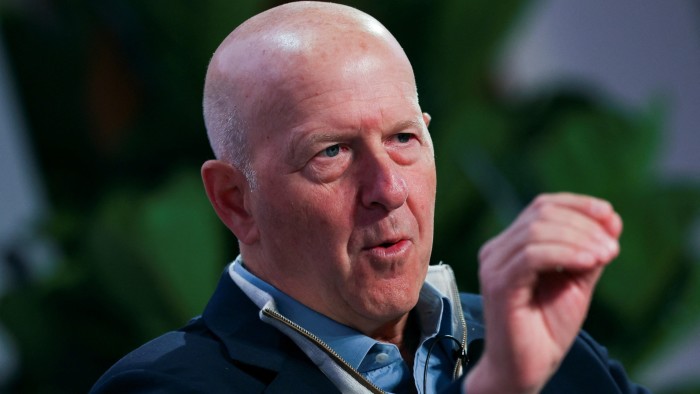Unlock the White House Watch newsletter for free
Your guide to what the 2024 US election means for Washington and the world
The US economy is in a “fragile place”, the chief executive of Goldman Sachs said on Tuesday, as the incoming Donald Trump administration promises policies that could stoke or constrain growth and fuel government deficits.
David Solomon said he was “incredibly optimistic” and expected the sweeping deregulation Trump promised would catalyse business investment.
But he also warned about the potential effects of Trump’s plans to clamp down on immigration, including deporting millions of immigrants who are living in the US illegally.
Solomon said the recent rise in long-dated interest rates — the yield on 10-year Treasury notes reached 4.79 per cent on Tuesday — primarily reflected market expectations of continued growth of US government debt.
“I’m quite optimistic, but we’re in a more fragile place,” he said at a New York conference hosted by the National Retail Federation, a trade association.
Solomon claimed regulations imposed by Joe Biden’s administration had caused CEOs to defer investment. The incoming Trump administration “has sent a clear message that they want to back that off. That’s very constructive for growth and investment, and so I think that’s a positive,” he added.
He said the renewal of tax cuts passed during Trump’s first time in the White House, many of which are due to expire this year, “can be stimulative”.
“But there are other things that the administration is talking about that we really need to see how they go forward,” Solomon said, including Trump’s threats to impose new tariffs on trading partners and restrict immigration.
Secure borders were important, he said. “But when you think about deportations, it’s very, very important that we balance all that with continued immigration growth, and we’ve got to get that balance right,” Solomon said.
“So you’ve got this cocktail of change, some of which can be quite constructive for growth, some of which has the potential to slow growth, and I think the thing we have to watch very carefully is how it’s all balanced,” he said.
Government bond markets have sold off in recent months, and rates jumped further after an unexpectedly strong US jobs report last week.
Solomon said he did not think the recent rise in yields reflected expectations of a more hawkish Federal Reserve or concerns strong inflation will persist.
He said: “We’ve really grown the debt stack. You really look at the deficit as a per cent of GDP. You look at some of the policy decisions and, I think it’s super important that we really get our spending and our deficit and the debt levels under control.”
Solomon added: “And I think one of the things that’s happening is real bond buyers are looking and saying, we’ve got a lot of financing coming forward as we go through the rest of the decade, and that’s pushing long rates higher. We haven’t seen that in a long time, that’s a change, and I think that’s something to watch.”
https://www.ft.com/content/a071ae48-9895-466a-9b92-4e6937ea93e2


